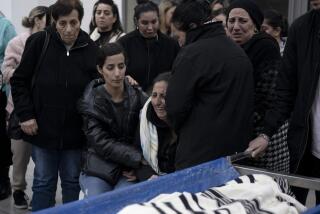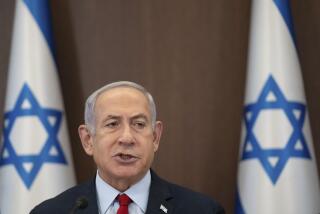Sharon Tries to Placate His Allies on Settlements
- Share via
JERUSALEM — Prime Minister Ariel Sharon, speaking a day after right-wing allies threatened to bolt his coalition government if he moved ahead with a proposal to dismantle some Jewish settlements, told Israeli lawmakers Monday he would seek their approval prior to any “unilateral” pullback measures.
In a stormy session of the Knesset, or parliament, the prime minister sought to placate hard-line parties that are committed to retaining all of the nearly 150 Jewish settlements in the West Bank and Gaza Strip -- even isolated communities that Sharon, the onetime patron of the settlement movement, has suggested he is now willing to relinquish.
“I will present steps the government plans to do for Knesset approval,” Sharon told lawmakers, raising his voice to speak above heckling that emanated from both left-wing and right-wing members. “As of today, those steps have yet to form.”
In speeches over the last two months, including an address to foreign journalists Sunday, Sharon has spoken frequently of the need for Israel to give up some settlements, either as part of an accord with the Palestinians or tied to Israel’s unilateral drawing of borders for a new Palestinian state. Such a scenario could come to fruition, the prime minister has said, should talks with the Palestinians break down.
But Sharon made no such reference in his Knesset appearance, the day after tens of thousands of settlers and their supporters staged a noisy demonstration in Tel Aviv. Instead, he insisted that the U.S.-backed peace blueprint known as the “road map” is still viable.
“I am not among those eulogizing the road map,” Sharon told lawmakers. “The road map is accepted by most countries worldwide and is the only way to reach an understanding.” Neither Israel nor the Palestinians, however, have moved beyond the most preliminary steps toward implementing the plan, which was unveiled with great fanfare at a springtime summit bringing together President Bush, Sharon and then-Palestinian Prime Minister Mahmoud Abbas, who later resigned.
Abbas’ successor, Ahmed Korei, has been much more cautious about contacts with Sharon, fearing being branded a stooge of the Americans and Israelis. Nearly three months after the Palestinian prime minister took office, he and Sharon have yet to inaugurate official contact.
Mindful of his own restive domestic audience, Sharon often allows subordinates and allies to speak for him, floating ideas that those on the right would find unpalatable.
Political foes and allies alike assumed that was the prime minister’s strategy when one of his confidants, Ehud Olmert, said in remarks published Monday that Israel might evacuate Jewish settlers from parts of the West Bank and Gaza in about six months. It was the first time any potential timetable for dismantling settlements had been unveiled by a figure close to the prime minister.
Olmert, Israel’s vice premier, told the Jerusalem Post that if there was no progress in negotiations with the Palestinians, Israel would by early summer start pulling back to what it considered defensible borders, evacuating some smaller settlements in the process.
“In my estimation, by the month of June, our preparations for major unilateral moves will be finished ... and this plan, including withdrawal from certain settlements, will begin to be implemented in the second half of this year,” Olmert said.
In his speech, Sharon confirmed recent Israeli media reports that he had appointed a top military official, Maj. Gen. Giora Eiland, to oversee his plan for “disengagement” from the Palestinians, in coordination with several Israeli government ministries.
Palestinians have been distressed by Sharon’s suggestion that he might abandon talks -- dormant though they are at the moment -- in favor of simply drawing a border to Israel’s specifications. They fear that an Israeli-imposed frontier would follow the route of the controversial barrier Sharon’s government is building to seal off the West Bank from Israel proper.
The wall, as Palestinians call it -- a melange of concrete barricades, wire fencing and other fortifications -- is becoming ever more visible on both sides of the divide.
This week, sections of high concrete barriers were lowered into place, cutting directly through Abu Dis, a densely populated Arab village outside Jerusalem.
Coinciding with the apparent impasse with the Palestinians, Sharon’s government has been divided over how to respond to recent overtures from Syrian President Bashar Assad.
On Monday, Israeli President Moshe Katsav announced that he had invited Assad to come to Jerusalem for talks. But Syrian officials responded coolly, suggesting that preconditions set by Sharon -- including severing Syrian ties with Islamic militant groups -- made a resumption of dialogue unlikely.
More to Read
Sign up for Essential California
The most important California stories and recommendations in your inbox every morning.
You may occasionally receive promotional content from the Los Angeles Times.













